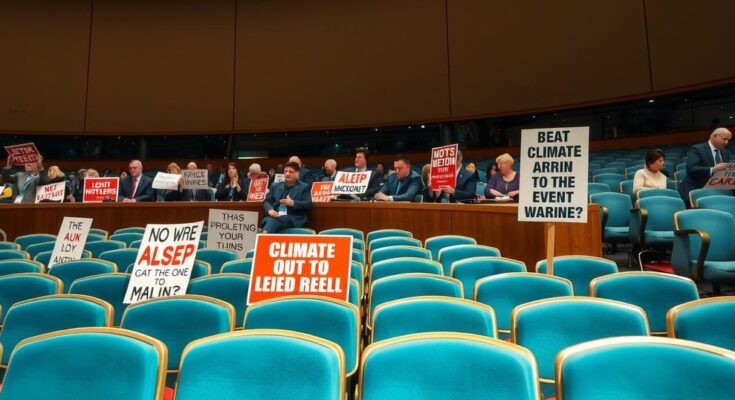COP29 ended with developed countries pledging US$300 billion annually for climate finance, which falls short of the US$1.3 trillion that African nations sought to effectively combat climate change. The disparity highlights ongoing challenges in securing adequate financial commitments, leading to disappointment among African representatives. Increased lobbying from the fossil fuel industry and geopolitical tensions also hindered progress, while strategies for future negotiations must be reassessed to better align with the continent’s needs.
The conclusion of the 29th annual Conference of the Parties (COP29) has been met with disappointment from African nations, as the financial commitments extended by developed countries are significantly insufficient. While the global north pledged US$300 billion annually for climate finance, the African bloc had aimed for a much-needed US$1.3 trillion to combat climate change effectively. This disparity highlights the challenges faced by developing countries in securing necessary funding for both adaptation and mitigation efforts against the increasing climate crisis.
During the conference, tensions arose over the insufficient amount of funding provided for climate adaptation in Africa. The US$300 billion per year is inadequate when considering inflation and the historical debt burdens that many African nations face. The African representatives at COP29 were particularly vocal in expressing their dissatisfaction, with some describing the financial agreement as an affront to the dire needs of their countries. Furthermore, the climate financing pledged could potentially exacerbate existing debts rather than alleviate the financial strain on these nations.
Several factors contributed to the failure to achieve the necessary funding goals at COP29. The significant presence of nearly 2,000 fossil fuel lobbyists affected negotiations, actively promoting the interests of the fossil fuel sector at the expense of more decisive climate action. Furthermore, geopolitical tensions and humanitarian crises across various nations diverted attention away from climate commitments, making them less of a priority for many developed countries. The choice of Azerbaijan, a fossil fuel-producing nation, as the host for COP29 also raised questions about the commitment to transitioning towards renewable energy, complicating the negotiation process for climate financing.
Moving forward, the outcomes of COP29 have led to the establishment of the “road to Belém” initiative, which aims to facilitate ongoing discussions around climate finance leading to COP30 in Brazil in 2025. African countries are urged to re-evaluate their negotiating strategies, particularly by leveraging their abundant natural resources. The global north’s appetite for energy transition minerals necessitates a recalibrated approach where access to these resources is contingent upon receiving adequate climate adaptation financing. Such strategies could shift the dialogue from mere negotiations to actionable commitments that directly address the pressing concerns of African nations regarding climate change.
The COP29 took place in November 2024, focusing on global climate change commitments and financial aid. African nations approached the conference with a well-defined target of US$1.3 trillion annually, derived from expert analyses indicating this as critical for their climate action plans. However, the negotiations concluded with a mere US$300 billion annual commitment from developed countries, which was far below the required amount. The inadequate funding reflects a broader issue of equity in climate finance, where developing nations feel marginalized in comparison to their more affluent counterparts. The dynamics of the conference were influenced not only by corporate interests but also by geopolitical factors, complicating the quest for genuine climate action and financing.
The outcomes of COP29 underscore the critical gap in climate financing for Africa, highlighting the urgent need for developed nations to honor their commitments and provide sufficient financial resources for climate adaptation and mitigation. The inadequate pledge of US$300 billion stands in stark contrast to the US$1.3 trillion identified as necessary by African leaders, indicating a serious misalignment in climate finance discussions. As the world moves toward COP30, it is imperative that African nations adopt strategic negotiating frameworks that leverage their resource wealth in exchange for much-needed climate finance, thereby transforming future dialogues into actionable outcomes.
Original Source: theconversation.com




